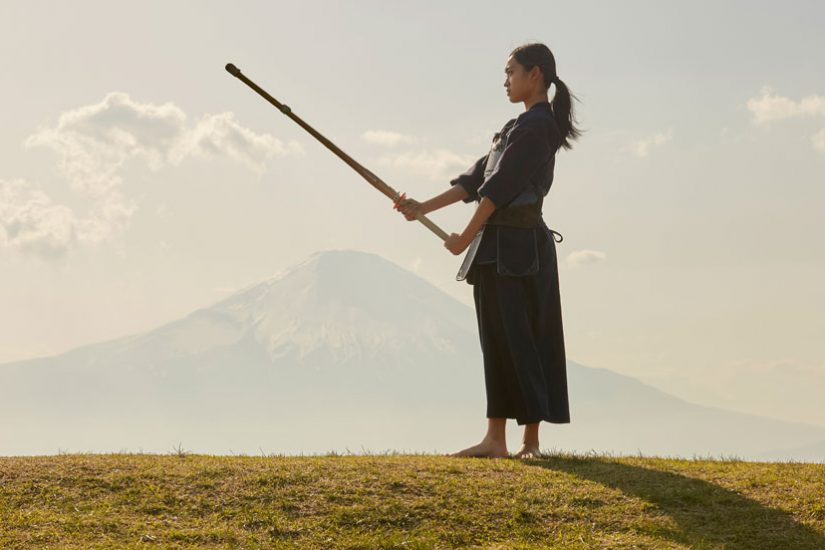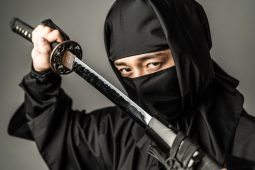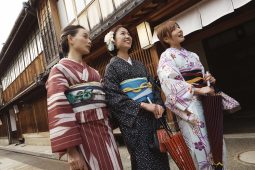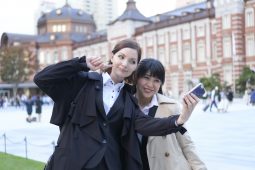There are a number of reasons why you might want to take up a martial art in Japan. The regular physical practice can help you keep fit, build confidence, and let off steam. A martial art can also be a gateway into Japanese culture. There are of course many famous martial arts to choose from, and in Japanese these are called budō (武道 — literally “martial way”), the hall in which these arts are practiced is a called a dōjō (道場 — “place of the way”), and practitioners often wear some sort of simple uniform called a dōgi (道着 — “clothes of the way”). You will notice that the kanji 道 meaning “way”, or “path” crops up a lot in this context. This kanji is important in East Asian philosophy and has the nuance of a “way of life” suggesting that the practice of budō is not just a way of self-defense but a way of self-improvement too. In the list below we look at some popular budō that are practiced around the country. Which way is for you?
Jūdō
Jūdō (柔道) means “gentle way” or “soft way” and is a modern martial art that is primarily practiced as a competitive sport. Developed by Kanō Jigorō (1860–1938) from the older art of jūjutsu (柔術 — “soft technique”) this sport emphasizes grappling and throwing techniques that use the momentum of an opponent’s attack. During a bout the aim is to immobilize your opponent with a throw or a hold. However, Kanō’s aim in creating this sport was to strengthen people’s bodies and minds. Today it is a popular sport around the world but you can still take lessons at Kanō’s original school, the Kōdōkan in Tokyo.
http://kodokanjudoinstitute.org/en/
Karate
Karate (空手) means “empty hand” and developed from Okinawan martial arts with strong influence from Chinese kung fu. Primarily this martial art employs striking and blocking movements with the hands, feet, elbows, and knees. This style of fighting was introduced to mainland Japan in the 1920 s by Funakoshi Gichin (1868–1957). He taught karate as a means of personal and spiritual development and insisted that 空手は君子の武芸 meaning “Karate is the martial art of the wise“. Funakoshi founded the Shōtōkan style of karate which remains the most widely practiced form of karate today. However, there are many other styles such as the “hard-soft” style of Gōjū-ryū, or the Kyokushin style which is also known as “full-contact karate”. The Japan Karate Association has branches all over Japan teaching the Shōtōkan style of karate:
https://www.jka.or.jp/en/
Aikidō
Aikidō (合気道) is sometimes translated as “the way of harmonious spirit”. This a form of self-defense developed by Ueshiba Morihei (1883–1969) which seeks to redirect the energy of an opponent’s attack while protecting both participants from serious harm. Typically an Aikidō practitioner will try to join the rhythm of their opponent and immobilize them by means of holds, lock joints, and throws. There is a strong spiritual element to Aikidō which Ueshiba taught as an “art of peace”. Many styles of Aikidō have developed since Ueshiba’s time but the original school is the Aikikai and this is still the largest organization.
http://www.aikikai.or.jp/eng/index.html
Kendō
Kendō (剣道) means the “way of the sword” and it is based on traditional sword-fighting techniques called kenjutsu (剣術). This is a modern competitive sport played using bamboo swords, called shinai (竹刀). Kendō is an energetic and lively sport in which participants duel using strikes and thrusts at predefined target areas — all of which are covered by protective armor called bogu (防具). As they leap into an attack, kendō players will yell a kiai (気合い) which is a kind of fighting shout and this also adds a touch of drama to about. If you are interested in trying this fast-paced martial art then the Kendo Jinko website has a list of classes all over Japan:
https://kendojinko.com/
Kyūdō
Kyūdō (弓道) means “the way of the bow” and is a form of traditional Japanese archery. This is an elegant martial art that emphasizes technique and can be practiced either as a competitive sport or simply as a contemplative practice. To find out more about kyūdō check the International Kyudo Federation webpage:
https://www.ikyf.org/








